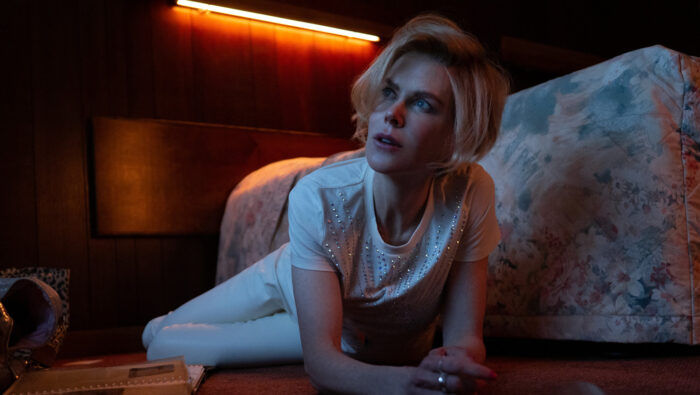UK TV review: Roar
Review Overview
Creativity
8Consistency
6David Farnor | On 17, Apr 2022
From Black Mirror to Inside No 9, anthologies have enjoyed a revival of late, their standalone story collections ideal for low-stakes binge-watching. Apple TV+ has delved into the format several times since its launch, including Little America and Amazing Stories. Landing between the two in terms of tone and closer to the latter in consistency, Roar is a study in what it means to be a woman today. Over eight episodes, creators Liz Flahive and Carly Mensch (who gave us GLOW) take us from body horror to interspecies romance.
Based on a collection of short stories by Cecelia Ahern, it begins with The Woman Who Disappeared, which stars Issa Rae as a writer whose memoir has become a smash hit. Whisked away to Los Angeles, she finds herself struggling to be seen at a string of meetings with white men keen to adapt her work for the screen. What starts out as quirky and observational becomes more pointed and chilling, anchored by Rae’s alert and composed presence that gradually descends into frustration – and it’s when the show embraces the more sinister undertones of each episode’s premise that Roar really works.
The Woman Who Found Bite Marks on Her Skin stars Cynthia Erivo as a high-flying businesswoman who returns to work after maternity leave. Torn between family and office life, from the urge to look after her sick daughter to the need to protect her job from a man trying to poach it, things turn worse when bite marks start to appear on her at random. If that sounds like a literal metaphor for life taking a bite out of her, director Rashida Jones gives it visceral and emotional weight by some superbly nasty practical effects, and Erivo’s unflinching performance.
Both have moments that linger long in the memory, but also highlight some of the other episodes that lack such impact. Nicole Kidman delivers a thoughtful turn in
Kim Gehrig’s The Woman Who Ate Photographs, which sees a women do exactly as the title suggest while trying to look after her mother, who is living with dementia. It’s an intimate meditation on memory and motherhood both as child and eventual carer, but it never quite turns its titular act into something either movingly substantial or eye-catchingly absurd.
The say-what-you-see episode title also limits The Woman Who Returned Her Husband, which follows a wife who remembers she has her warranty for her spouse and takes him back to the store to exchange him for another one – while all the discarded husbands are discounted over and over again to attract a new buyer. But Quyen Tran’s colourfully drawn near-future world doesn’t really follow the idea through beyond its central metaphor – although Meera Syal’s wonderfully nuanced performance still delivers a moving and honest dissection of happiness and long-term relationships.
Perhaps best of all is The Woman Who Was Fed by a Duck, a twisted rom-com that stars Merritt Wever as a 30-something woman who finds herself striking up a flirtatious interaction with a duck in her local park. That bizarre starting point is disarming enough for us to take a leap along with her, but things slowly turn darker and Flahive’s direction seamlessly steers the tone from cute to surprisingly chilling.
Equally unexpected is The Woman Who Was Kept on a Shelf, which stars Betty Gilpin as a model who is married by a businessman (Daniel Dae Kim) with the aim of making her his trophy wife. When that becomes a little too literal, Gilpin’s bewildered spouse has to reclaim her agency with a wonderfully virtuosic bit of physicality.
Gilpin’s fellow GLOW veteran Alison Brie faces a similar challenge in The Woman Who Solved her Own Murder, as the ghost of a murder victim who finds herself haunting the detectives investigating her death. With each new piece of evidence, though, it’s not just a whodunnit she must solve but also a web of male prejudices she has to unpick, as they repeatedly make judgements based on stereotypes. It’s a smart take on a crime drama narrative, one that raises the danger of incel males and reinforces the anthology’s over-arching theme – that women today are often in positions of not being heard or seen, whether that’s due to race, age, abusive relationships or guilt instilled and entrenched by a patriarchal society. Roar may not always be the most consistently satisfying response to these problems, but it’s a creatively ambitious one that leaves you wanting to hear more from the storytellers’ voices behind it. And that, perhaps, is the best possible end result.



















